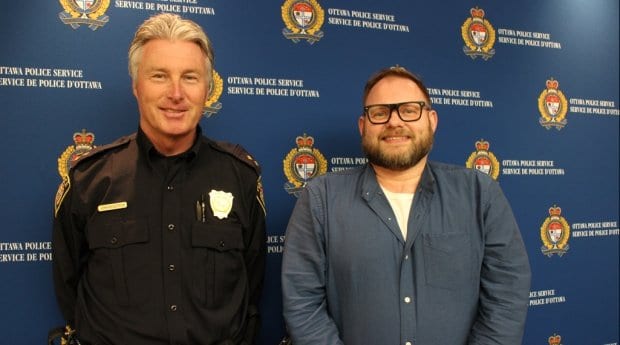Gary Leger recently resigned as community co-chair of the Ottawa Police Service (OPS) GLBT liaison committee because he moved to Toronto for a new job.
Leger joined the committee in 2010 and served a term as vice co-chair before becoming community co-chair last year. He talks about the committee’s challenges and accomplishments in this edited interview.
Daily Xtra: What made you decide to join the committee?
Gary Leger: When I decided to join the committee, I wanted to play more of an active role in the LGBTQ community in Ottawa. I wanted to be more involved in the decision-making. I wanted to make a change in what was going on or have a positive impact in some of the changes that were going on at the time in the community.
What were the issues that you thought the liaison committee could address?
Back then, I think some of the issues that were coming up were more about relationship building, working on having a better cohesiveness between police and the community. Engaging community partners, having a say in some of the policies and procedures that police hold with regard to the LGBTQ community. Training officers, what information is assimilated for officers and how they interact with the community were some of the topics that were kind of at the forefront when I started. I came on to the liaison committee just as the [police’s internal review regarding the Steven Boone press release] had wrapped up.
That was a hot time for the liaison committee.
It was. They had just come off that hot topic and that very divisive time where the community didn’t agree with what the police were doing and they certainly didn’t agree with the approach the police had taken in how the information got out and how HIV was viewed from a policing perspective and a community perspective. The committee was still reeling . . . and a lot of people walked away from the table at that point.
What made you decide to do the opposite and join the committee?
I find the LGBTQ community in Ottawa has a bad habit of jumping up and down and screaming when there’s an issue, and when there are no issues you don’t [stick around]. Rather than take that backseat approach I decided that I wanted to join to make a difference, to actually change procedures and change policies within police and change views more than anything. [I didn’t] take that approach of vocalizing my opinion like so many did and then walking away from the table when they don’t like what they hear or they don’t get the results that they want.
What stands out to you most from your years on the committee?
I think some of the good work that was done stands out the most. The [consultation] process [for media releases] that was put in place post-Boone and updating the education for new recruits. The information exchanges were solid and had good participation from police and service providers. There’s been a lot of dialogue in the past few years with regard to the trans community. I think [trans issues] are looked at in a positive light as opposed to some other police jurisdictions across the country. The OPS liaison committee seems to be at the forefront of moving forward some of their policies.
Community members who criticize the liaison committee often hold the view that only pro-police community members join the committee. What do you say to those kinds of arguments?
If they were sitting at the table and they heard some of the comments that I made they would probably think differently. I side with the community more than anything, and a lot of people in that room look out for the community’s best interests. The chief of police of course has an agenda as to what he wants to see move forward. Police are very strong with that line and I don’t necessarily share that point of view. I got criticized by community and I also got criticized by police for speaking my mind and it’s a hard balancing act to follow.
What advice do you have for the new community co-chair?
The only word of advice I can give to anyone stepping into that role is just because police don’t necessarily agree with what you say, it doesn’t mean they’re absolutely right in their positioning. It’s not a role where everybody has to agree. Quite often you have to agree to disagree. You have to reach some kind of common ground. You can’t go there swinging a bat all the time. You have to choose your battles because there are plenty of them, but at the same time you have to do what’s right for the community.


 Why you can trust Xtra
Why you can trust Xtra


